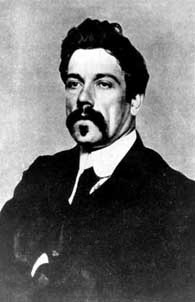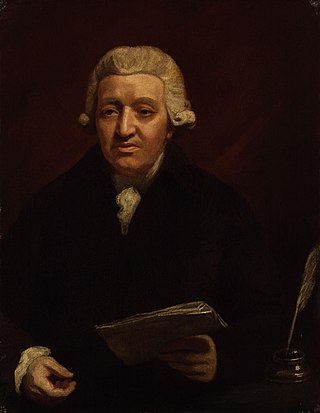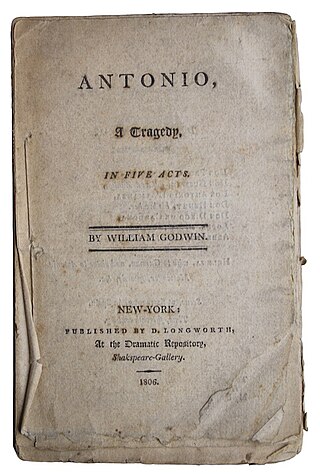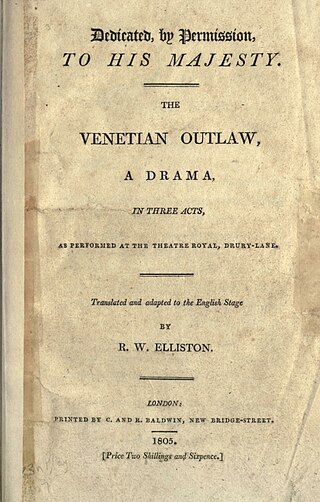
Edmund John Millington Synge was an Irish playwright, poet, writer, collector of folklore, and a key figure in the Irish Literary Revival. His best known play The Playboy of the Western World was poorly received, due to its bleak ending, depiction of Irish peasants, and idealisation of parricide, leading to hostile audience reactions and riots in Dublin during its opening run at the Abbey Theatre, Dublin, which he had co-founded with W. B. Yeats and Lady Gregory. His other major works include In the Shadow of the Glen (1903), Riders to the Sea (1904), The Well of the Saints (1905), and The Tinker's Wedding (1909).

The University Wits is a phrase used to name a group of late 16th-century English playwrights and pamphleteers who were educated at the universities and who became popular secular writers. Prominent members of this group were Christopher Marlowe, Robert Greene, and Thomas Nashe from Cambridge, and John Lyly, Thomas Lodge, and George Peele from Oxford. Thomas Kyd is also sometimes included in the group, though he was not from any of the aforementioned universities.
The Battle of Hastings is a 1778 play by the English writer Richard Cumberland. It is a tragedy set around the Battle of Hastings in 1066. It was staged at the Drury Lane Theatre in October 1778 by Richard Brinsley Sheridan. Sheridan later mocked Cumberland's sensitivity to criticism by modelling the character Sir Fretful Plagiary, in his 1779 play The Critic, after him.

The Fair Circassian is a 1781 tragedy by the British writer Samuel Jackson Pratt. It is an adaptation of the novel Almoran and Hamet by John Hawkesworth. He wrote the lead role for his friend Sarah Siddons, but due to other commitments it ended up being played by Elizabeth Farren.

Capel Street Theatre was an 18th-century theatre located on Capel Street in Dublin, Ireland.
Busiris, King of Egypt is a 1719 tragedy by the British writer Edward Young. It is set in Ancient Egypt during the reign of Busiris. It was considered a success, enjoying a good run and was subsequently published by Jacob Tonson. The work was dedicated to the Duke of Newcastle who as Lord Chamberlain oversaw the theatres.
The Campaign: or, Love in the East Indies is a 1784 comedy play with songs by the Irish writer Robert Jephson.
The Count of Narbonne is a 1781 tragedy by the Irish writer Robert Jephson. It was inspired by Horace Walpole's novel The Castle of Otranto.
King Edward The Third; With The Fall Of Mortimer, Earl Of March is a 1690 tragedy, generally attributed to the English writers John Bancroft and William Mountfort. It was first performed by the United Company at the Theatre Royal, Drury Lane in London. It portrays the early years of the reign of Edward III and his defeat and execution of Roger Mortimer, Earl of March.

Adelgitha is a tragedy by the British writer Matthew Lewis. It premiered at the Theatre Royal, Drury Lane on 30 April 1807 having originally been published the year before. The cast included Henry Siddons, Robert William Elliston, George Frederick Cooke and Jane Powell while the incidental music was composed by Michael Kelly. It was one in a run of Gothic plays Lewis produced following the success of The Castle Spectre. The play is set in Otranto around 1080 which was ruled over by Robert Guiscard following the Norman conquest of southern Italy.

Swedish Patriotism is an 1819 stage melodrama by the British writer and actor William Abbot. It premiered at the Theatre Royal, Covent Garden on 19 May 1819. The London cast included Daniel Terry as Colonel Walstein, Abbot as Captain Albert, Maria Foote as Ulrica, John Liston as Walter, Charles Connor as Colonel Langstorff and Daniel Egerton as Count Cronstedt. It then appeared at the Park Theatre in New York on 1 December 1819 with Robert Maywood as Walstein.

The Youthful Days of Frederick the Great is an 1817 stage melodrama by the British writer and actor William Abbot. It premiered at the Theatre Royal, Covent Garden in London on 2 October 1817. The cast included Daniel Terry as Frederick William, King of Prussia, Abbot as The Prince Royal, Daniel Egerton as Baron Kniphausen, Chapman as Count Seckendoff, Charles Connor as Anhalt, Charles Farley as Frederstoff and Harriet Faucit as Christine.
Fredolfo is an 1819 historical tragedy by the Irish writer Charles Maturin. It premiered at the Theatre Royal, Covent Garden in London on 12 May 1819. The original cast included William Macready as Wallenberg, Charles Mayne Young as Fredolfo, Charles Kemble as Aldemar, Frederick Henry Yates as Berthold, Charles Connor as Waldo and Elizabeth O'Neill as Urilda. Maturin dedicated the published version to the Duke of Leinster, which was published by Archibald Constable. The work was considered a failure which failed to recaptured the success of his earlier Bertram and Maturin turned back to writing novels.

Manuel is an 1817 tragedy by the Irish writer Charles Maturin. It premiered at the Theatre Royal, Drury Lane in London on 8 March 1817. The original cast included Edmund Kean as Manuel, Count Valdi, Alexander Rae as De Zelos, James William Wallack as Torrismond, Charles Holland as Mendizabel, Thomas Cooke as Almorad, John Powell as Guide and Margaret Somerville as Victoria. The published work is dedicated to the writer Walter Scott. It takes place in the wake of the Battle of Las Navas de Tolosa in Spain. It failed to recapture the success of his debut play Bertram of the previous year, despite both starring Kean.

Bertram; or The Castle of St. Aldobrand is an 1816 Gothic tragedy by the Irish writer Charles Maturin, his first and most successful play. It premiered at the Theatre Royal, Drury Lane in London on 9 May 1816. The original case included Edmund Kean as Bertram, Alexander Pope as St Aldobrand, Charles Holland as Prior of St Anslem, John Powell as Monk, Thomas Cooke as Robber, Margaret Somerville as Imogine and Susan Boyce as Clotilda. The prologue was written by John Hobhouse. The 1827 opera Il pirata composed by Vincenzo Bellini uses a libretto by Felice Romani inspired by Maturin's work.
The Land We Live In is an 1804 comedy play by the British writer Francis Ludlow Holt. It appeared at the Theatre Royal, Drury Lane in London on 29 December 1804. The cast included Dorothea Jordan as Lady Lovelace, Richard Wroughton as Sir Rowland English, William Powell as Sir Edward Melville, Robert William Elliston as Young Melville, William Barrymore as Sir Harry Lovelace, Vincent De Camp as Harcourt, John Bannister as Dexter, Ralph Wewitzer as Peter, Charles Mathews as Robert, John Henry Johnstone as Larry MacBoof, William Chatterley as Waiter, Maria Kemble as Miss Betty, Sarah Sparks as Mrs Doublecharge, Harriet Mellon as Polly, Charlotte Tidswell as Susan.

Antonio, or the Soldier's Return is an 1800 historical tragedy by the British writer William Godwin. It premiered at the Theatre Royal, Drury Lane on 13 December 1800. The cast included John Philip Kemble as Antonio, Sarah Siddons as Helena, William Barrymore as Don Gusman, Richard Wroughton as Don Pedro, Charles Kemble as Don Henry William Powell as Don Diego. Both the audience and critical reaction was negative. Seven years later another of Godwin's plays Faulkener was staged at the same theatre.

Faulkener is an 1807 historical tragedy by the British writer William Godwin. The play premiered at the Theatre Royal, Drury Lane on 16 December 1807. The cast included Robert Elliston as Faulkener, Henry Siddons as Stanley, Harriet Siddons as Lauretta, Jack Palmer as Benedetto, William Powell as Orsini and Jane Powell as Arabella.

The Venetian Outlaw is an 1805 play by the British writer and actor Robert William Elliston. It premiered at the Theatre Royal, Drury Lane in London on 26 April 1805. The cast included James Grant Raymond as The Doge, William Barrymore as Count Orsono, Robert William Elliston as Vivaldi, William Powell as Alfieri, William Dowton as Calcagno, George Bartley as Carnevaro, George Cooke as Spalatro and Nannette Johnston as Rosara. The published play was dedicated by Elliston to George III. It was based on an 1801 French play L'Homme à Trois Visages by René-Charles Guilbert de Pixérécourt, which also inspired Rugantino by Matthew Lewis.

Rugantino is an 1805 melodrama by the British writer Matthew Lewis. An afterpiece, it was originally staged at the Theatre Royal, Covent Garden on 18 October 1805. It was inspired by the 1801 French play L'Homme à Trois Visages by René-Charles Guilbert de Pixérécourt. The original cast included Charles Murray as Andreas, Duke of Venice, John Liston as Meme, William Abbot as Poole, Henry Erskine Johnston as Rugantino and Isabella Mattocks as Camilla. It premiered in Ireland at Dublin's Crow Street Theatre on 26 January 1807. It was revived at Drury Lane in 1820 with a cast featuring James William Wallack as Rugantino, Thomas Cooke as Contarino, William Oxberry as Memme, John Pritt Harley as Stephane, Walter Maddocks as Harald, Sarah Sparks as Camilla and Charlotte Tidswell as Bettina.













